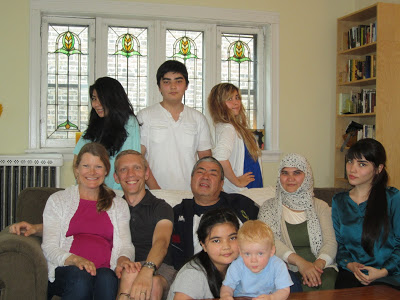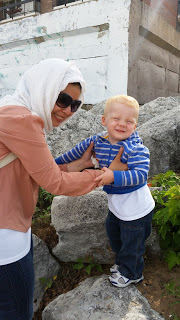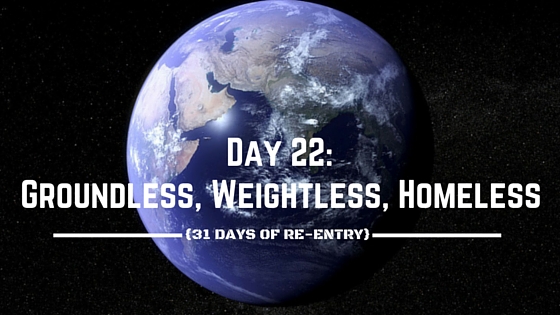I just don’t fit in here. Will I ever belong? Will I always feel like an outsider? Will I make a difference?
These are questions I asked myself after moving across the globe to live in rural China, but this was certainly not the first time I had asked them. I thought this after changing schools multiple times during elementary and middle school, beginning high school and college, and moving to Chicago to begin teaching in the inner city. I have asked them for the past five years since returning from China and over the last six months after moving to a new city in the U.S.. Life thus far has been a series of shifts and faults in the earth that I have falsely assumed should be stable ground, leaving me scrambling for stability and significance.
I first read the book Compassion, written by Henri Nouwen, Donald McNeill and Douglas Morrison, sitting on a straw mat on the front porch of a house in a village on the outskirts of Kampala, Uganda. I was 21 and just learning what it meant to feel “displaced.” I have come back to a particular chapter in the book several times over the past 15 years, called “Displacement,” through multiple moves and job changes, to be reminded of God’s view of my shifting world. It is a bit abstract, but I have found it to be so helpful in putting the transitions in my life into perspective that I am sharing many of the parts of the chapter that I have starred and underlined over the years with you.
Moving from the Ordinary and Proper Place
Christians love to talk about community. This book mentions that the “desire for community is most often a desire for a sense of unity, a feeling of being accepted, and an experience of at-homeness” (62). But the authors challenge that “the paradox of the Christian community is that people are gathered together in voluntary displacement. The togetherness of those who form a Christian community is a being-gathered-in-displacement.
According to Webster’s dictionary, displacement means, to move or to shift from the ordinary or proper place. This becomes a telling definition when we realize the extent to which we are preoccupied with adapting ourselves to the prevalent norms and values of our milieu” (63).
The authors suggest that “The call to community as we hear it from our Lord is the call to move away from the ordinary and proper places. Leave your father and mother. Let the dead bury the dead. Keep your hand on the plow…The Gospels confront us with this persistent voice inviting us to move from where it is comfortable, from where we want to stay, from where we feel at home” (63).
“Why is this so central? It is central because in voluntary displacement, we cast off the illusion of ‘having it together’ and thus begin to experience our true condition, which is that we, like everyone else, are pilgrims on the way, sinners in need of grace…Voluntary displacement leads us to the existential recognition of our inner brokenness and thus brings us to a deeper solidarity with the brokenness of our fellow human beings” (64).
The authors illustrate Jesus as the ultimate reason why we should move towards displacement through the examples of His birth in Bethlehem, being taken to Egypt to escape King Herod, leaving His parents to be in the Temple, going to the desert to be tempted for 40 days and continually moving “away from power, success and popularity in order to remain faithful to His divine call…Jesus’ displacement…finds its fullest expression in His death on a cross outside the walls of Jerusalem” (65).
To Disappear as an Object of Interest
The authors do warn against romanticizing displacement, as many who have been displaced for tragic reasons are broken and feel that they have suffered irreparable damage. But in this, followers of Christ are called “to solidarity with the millions who live disrupted lives” (66).
“Voluntary displacement leads to compassionate living precisely because it moves us from positions of distinction to positions of sameness, from being in special places to being everywhere…To disappear from the world as an object of interest in order to be everywhere in it by hiddenness and compassion is the basic movement of the Christian life. It is the movement that leads to community as well as to compassion. It leads us to see with others what we could not see before, to feel with others what we could not feel before, to hear with others what we could not hear before” (67).
Struggling with the desire to be distinctive, significant and extraordinary, some of my biggest hurdles in life have come when I have not felt useful. I first experienced this in Uganda when I found that my presence was often more of a detriment and burden than an asset because I could not speak the language and was just learning about the culture. I lived with an African family and their maid who cooked for me, carried up my water from the river, cleaned my room and washed my clothes. When I offered to help with the dishes, my host mom told me she didn’t think I could get them clean enough. Proud and indignant, I set my alarm for 5 am the next morning and quietly took my place in the yard next the maid to scrub pots and pans.
Now, I am currently wrestling with not only not living overseas, but being a stay-at-home mom in a very homogeneous neighborhood in America. I have certainly “disappeared from the world as an object of interest” and struggle with guilt over not living the radical life I once thought I would live. But the chapter addresses my current struggles in the following ways:
“The implications for each of us individually vary according to the specific milieus in which we live and our concrete understandings of God’s call for us…for many people it does not even mean physical movement, but a new attitude toward their factual displacement and a faithful perseverance in their unspectacular lives…Therefore, the movement toward compassion always starts by gaining distance from the world that wants to make us objects of interest” (67).
Recognizing Our Displacement
“What does this mean for us in terms of voluntary displacement? If voluntary displacement is such a central theme in the life of Christ and His followers, must we not begin by displacing ourselves? Probably not. Rather, we must begin to identify in our own lives where displacement is already occurring. We may be dreaming of great acts of displacement while failing to notice in the displacements of our own lives the first indications of God’s presence” (71).
“In our modern society with its increasing mobility and pluriformity, we have become the subjects and often the victims of so many displacements that it is very hard to keep a sense of rootedness, and we are constantly tempted to become bitter and resentful. Our first and often most difficult task, therefore, is to allow these actual displacements to become places where we can hear God’s call” (72).
“It often seems easier to initiate a displacement that we ourselves can control than freely to accept and affirm a displacement that is totally out of our hands. The main question is, ‘How can I come to understand and experience God’s caring actions in the concrete situation in which I find myself?’…God is always active in our lives. He always calls, He always asks us to take up our crosses and follow Him” (72-73).
Displacement is not primarily something to do or to accomplish, but something to recognize…We do not have to go after crosses, but we have to take up the crosses that have been ours all along. To follow Jesus, therefore, means first and foremost to discover in our daily lives God’s unique vocation for us” (73).
“The more we are able to discern God’s voice in the midst of our daily lives, the more we will be able to hear Him when He calls us to more drastic forms of displacement…But everyone must live with the deep conviction that God acts in her or his life an equally unique way…when we have learned to see Him in the small displacements of our daily lives, the greater call will not seem so great after all” (74).
How has moving away from the “ordinary and proper places” helped you to be more compassionate towards others? Where in your life is displacement already occurring? How have you heard from God in this?
Follow me on Twitter and Facebook
This post is day 24 of the series “Re-entry: Reflections on Reverse Culture Shock,” a challenge I have taken to write for 31 days. Check out my other posts in the series:
Day 1: Introduction
Day 2: Grieving
Day 3: No One Is Special
Day 4: Wasted Gifts
Day 5: I Never Expected…
Day 6: Identity: Through the Looking Glass
Day 7: Did I mishear God?
Day 8: When You Feel Like Shutting Down
Day 9: Caring for your Dorothy
Day 10: You’re Not the Only One Who’s Changed
Day 11: 12 Race Day Lessons for Serving Overseas
Day 12: Confessions of an Experience Junkie
Day 13: Longing for Home
Day 14: Readjusting: Same Tools, Different Work Space
Day 15: Book Review: The Art of Coming Home
Day 16: The Story of My “Call”
Day 17: Is Missions a “Higher Calling”?
Day 18: And Then I Fell in Love
Day 19: Is God Calling You Overseas?
Day 20: Life Is Not Seasonal
Day 21: What I Took and What I Left Behind
Day 22: Groundless, Weightless, Homeless
Day 23: When the Nations Come to You
Day 24: The Call to Displacement
Day 25: Scripture Anchors for Re-Entry
Day 26: In the Place of Your Exile
Day 27: Resources for Re-entry
Day 28: A Time for Everything: A Prayer of Leaving
Day 29: Journal: 8 Months After Re-Entry
Day 30: 12 Survival Tips for Re-Entry
Day 31: A Blessing
(Day 32: Writing is Narcissistic (And Four Other Reasons Not to Write)–a reflection on this Write 31 Days experience)











